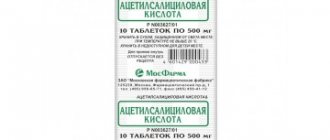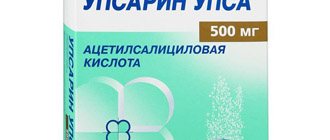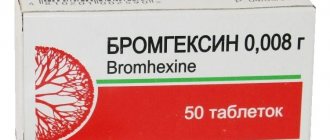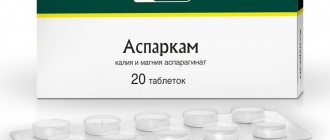Composition and effectiveness
In its pure form, ASA is a white, finely crystalline powder with a noticeably sour taste. It is an acetic ester, soluble in water and alcohols. The drug quickly relieves pain and has a pronounced antipyretic, anti-inflammatory, and antiplatelet effect. Its effectiveness is similar to other NSAIDs - non-narcotic analgesics.
- The analgesic properties of ASA are due to its effect on the central nervous system, the activity of prostaglandins and other mediators of pain sensitivity.
- A decrease in body temperature occurs due to the correction of the thermoregulation center, vasodilation and a pronounced diaphoretic effect.
- Inflammatory reactions are eliminated due to the effect of acetylsalicylic acid on the capillary network: reducing the permeability of vascular walls, blocking enzymatic and energetic activity in pathological foci.
- Aspirin has the ability of an anticoagulant: it prevents platelet aggregation (sticking together), slows down the synthesis of prothrombin, which is responsible for blood clotting. This reduces the risk of thrombosis and associated life-threatening conditions.
Acetylsalicylic acid is absorbed almost completely into the bloodstream from the stomach cavity within 10–15 minutes. Severe symptoms of the disease subside immediately:
- dizziness, headache, joint and muscle pain decreases;
- temperature indicators decrease;
- the feeling of heat and other signs of malaise disappear.
As a result of taking aspirin, a decrease in temperature in patients is often accompanied by profuse sweating.
The decay period of acetylsalicylic acid in the body is about 1–2 hours. Metabolites are excreted in the urine. The therapeutic effect of the drug persists for some time.
Due to its rapid therapeutic effect and effectiveness in treating a variety of diseases, acetylsalicylic acid is classified as an emergency medicine and is on the list of vital drugs.
Diagnosis of the state of poisoning
Diagnostic criteria:
· Clinical suspicion.
· Taking ASA drugs in doses above toxic levels.
· Symptoms of hyperventilation.
· Metabolic acidosis without a known cause.
Diagnosis can only be made by measuring plasma concentrations of salicylic acid. Although there is no absolute correlation between plasma SA concentrations and symptoms, toxic reactions occur in most subjects at values above 3.0 mmol/L in adults and 2–3 mmol/L in children. The usual therapeutic level is 0.7-2.2 mmol/L.
Indications and doses
Acetylsalicylic acid is prescribed for the following pathologies:
- febrile symptoms of inflammatory and infectious diseases;
- mild and moderate pain syndromes of various origins: migraine, neuralgic manifestations, myalgia;
- rheumatic joint damage;
- risk of thrombosis and thromboembolism;
- the risk of development and consequences of myocardial infarction;
- acute ischemic stroke;
- in complex therapy: alcohol withdrawal syndrome.
The recommended dose of the drug depends on the type and severity of the disease:
- for high fever, ARVI, pain - 100–500 mg three times a day;
- for intense fever - up to 1.5 g per day;
- for rheumatoid polyarthritis, other joint inflammations, myocardial diseases - up to 4 g daily.
Acetylsalicylic acid should be taken after meals. It is recommended to grind the non-coated tablets into powder and wash them down with plenty of warm water. You can use a slightly alkaline mineral one. The effervescent drug must first be dissolved in 50–60 ml of liquid. In liquid form, acetylsalicylic acid is absorbed faster into the blood and has less contact with the gastric mucosa.
Aspirin for the heart
All cardiologists in the world argue that acetylsalicylic acid or aspirin should be prescribed to all patients at risk of complications from the cardiovascular system. It is believed that this drug should be taken by everyone who has no contraindications.
What does aspirin do?
It turns out that aspirin prevents platelets from sticking together; it is this property of aspirin that is used to prevent diseases that are accompanied by the formation of blood clots.
These are diseases such as varicose veins, angina pectoris, hypertension, stroke, myocardial infarction. The drug is used specifically to prevent complications, that is, it is capable of thinning the blood.
However, aspirin, like all anti-inflammatory drugs, has an important side effect - the development of inflammatory changes in the stomach, the formation of gastrointestinal ulcers, and after prolonged use, there is a risk of gastric bleeding.
It should be noted that currently the production of enteric-soluble aspirin has been established; the medicine is enclosed in a shell that is not dissolved by stomach enzymes and begins to be digested only in the intestines, where the effect of aspirin is not so dangerous. Such aspirins are suitable for everyone and even people who cannot tolerate this drug. They can be prescribed to patients suffering from erosive gastritis, peptic ulcer, but not exacerbation. The capsule or tablet must be taken without chewing or breaking.
Scientists have found that nitroglycerin preparations, which are prescribed in parallel with taking aspirin, reduce the negative effect of aspirin on the gastrointestinal tract. Namely, taking nitrates reduces the risk of bleeding ulcers by 40%.
There is a misconception that aspirin is substituted with ascorbic acid. No and no again. These are completely different drugs. Acetylsalicylic acid cannot be replaced with lemon or kiwi, and no dietary supplement is an alternative to aspirin. But nature provides aspirin in the form of meadowsweet or meadowsweet. The main components of this herb are salicylic acid derivatives. Meadowsweet has a positive effect on the human body without causing side effects that are characteristic of salicylates. If you take meadowsweet for a long time, say one year, then cholesterol levels decrease, heart rate improves, shortness of breath disappears, and blood pressure normalizes. But in order to start taking meadowsweet, you need to consult with your doctor.
For preventive purposes, herbalists recommend:
1 tsp Brew ground meadowsweet grass in a teapot along with green tea, leave for 7-10 minutes and take 1-3 cups a day at any time.
If your blood pressure rises at the age of 30 and if your relatives suffer from CVD, then, after consulting with a doctor, you should already take aspirin, that is, begin CVD prevention, naturally, based on the state of the cardiovascular system. And we must also remember that after 45 years, the risk of heart complications increases several times.
.
Therefore, you should not forget aspirin!
By the way! Scientists have recently discovered that when taken over a long period of time, aspirin prevents the development of certain types of cancer, such as colon, stomach, esophagus, pharynx and even breast cancer. And, if the disease is diagnosed in the early stages, then regular use of aspirin will slow down the growth of malignant tumors.
When leaving the hospital, you must carefully listen to the recommendations of the attending doctor and strictly follow them. Many patients believe that after being treated in a hospital, they are freed from their illness. But this is a misconception. The disease has receded thanks to the efforts of the doctor, but in the future it must be kept “in check”, that is, strictly follow the work and rest schedule, take recommended medications, including aspirin. And all the time. And then you won’t face repeated hospitalizations for complications. And if you want to live a long life without getting sick, then consult your local doctor and take aspirin to prevent complications of cardiovascular diseases.
The conversation was compiled by:
GBUZ SO "City Hospital of Kamensk-Uralsky"
Ronzhina N.P.
Side effects
Side effects of acetylsalicylic acid include:
- dyspeptic symptoms: nausea, cramps, epigastric discomfort, lack of appetite;
- noise in the ears and head, weakness, dizziness;
- allergic urticaria;
- in severe cases: Quincke's edema or anaphylactic shock.
Aspirin intoxication develops after exceeding the maximum dose. It manifests itself as increased side effects: hearing loss, dizziness, heartburn, dryness and an unpleasant taste in the mouth.
Data
Acetylsalicylic acid (aspirin) is widely used and is one of the most common substances for poisoning. This happens during suicide attempts in adults and accidentally in children.
According to statistics, the frequency of ASA consumption is:
· Decreased due to association with the development of Reye's syndrome in children and the development of other nonsteroidal anti-inflammatory drugs (NSAIDs).
· Increased due to the prevention of thrombosis of cardiovascular and cerebrovascular diseases.
Aspirin remains one of the most frequently used drugs by patients without a doctor's prescription.
Poisoning therapy
Therapy consists of the following processes.
1. Alkalinization with sodium bicarbonate. At a normal pH of 7.40, most salicylic acid is in the ionic form, which does not cross the blood-brain barrier as well as the uncleaved form (H++ Sal->HSal). If the pH increases, even more HSal will be broken down into ions, which helps clear HSal from the brain. Initially, bicarbonate delivery will increase plasma salicylate due to salicylate release from tissue. Alkalosis is not a contraindication for bicarbonate infusion; plasma pH is <7.60. Urine pH should be between 7.5 and 8.
2. Alkalinization of urine. It is effective because it increases salicylate secretion.
By increasing urine pH from 6.5 to 8.1 by adding bicarbonate, the total excretion of salicylate increases fivefold or more.
3. Intubation if necessary. Great care is advised as intubation may worsen the condition.
4. Oxygen. Oxygen supplements should be given as needed. In case of lung injury, there is a high need for it.
5. Restoring water balance. The patient may be hypotensive, in part due to inappropriate systemic vasodilation. Aggressive fluid delivery is acceptable unless there is cerebral or pulmonary edema.
6. Glucose. ASA poisoning reduces glucose levels in the central nervous system, despite normal peripheral blood sugar levels. Supplementation with 100 mL 50% dextrose (adults) is considered in patients with altered mental status regardless of blood sugar.
7. Vitamin K supplements.
Symptomatic treatment of complications in the second stage of poisoning requires hemodialysis.
Aspirin Cardio and Cardiomagnyl: what is the difference?
Aspirin Cardio contains only acetylsalicylic acid. Cardiomagnyl differs from Aspirin Cardio in an additional component. In addition to acetylsalicylic acid, the medicine also contains magnesium hydroxide. This micronutrient is necessary to protect the gastric mucosa.
Aspirin Cardio is an inexpensive but effective antiplatelet drug. It is actively used to prevent heart and vascular diseases. You should take the medicine only as recommended by your doctor. The effect is achieved with long-term and continuous treatment.
Cardiomagnyl, 75 mg+15.2 mg, film-coated tablets, 100 pcs.
Takeda, Germany
Price from 173₽
Cardiomagnyl, 150 mg+30.39 mg, film-coated tablets, 30 pcs.
Takeda, Germany
Price from 120₽
Cardiomagnyl, 150 mg+30.39 mg, film-coated tablets, 100 pcs.
Takeda, Germany
Price from 328₽
There are contraindications. Specialist consultation is required.
Dosage Forms
The medication is available in tablet form. The tablets have a special protective coating that is not subject to dissolution in the acidic environment of the stomach. The shell of the tablet form dissolves only in the cavity of the duodenum. This form allows you to prevent damage to the gastric mucosa during long-term use. The medicine is also suitable for patients with concomitant diseases of the digestive tract.
Dosages of tablets can be as follows:
- 100 mg,
- 300 mg.
People often wonder who the manufacturer of Aspirin Cardio is. The medicine is produced by Bayer (Germany).
Asirin Cardio tablets
Safety of Phenazepam
Phenazepam is a relatively safe drug. But this statement is only true if the patient takes it in accordance with the dosage and in cases prescribed by the doctor. Some drug addicts use the medicine together with the drug to enhance the effect. This is a very dangerous combination that can lead to death. There are also known fatal cases after using Phenazepam and other psychostimulants.
The half-life of Phenazepam from the body does not exceed 10 hours. However, in some patients, especially those with liver disease, this time almost doubles. To safely take Phenazepam, you should wait 2 to 3 days after your last drink.
Alcohol dependence increases the risk of developing dependence on this tranquilizer. Therefore, in case of alcoholism, the drug is prescribed with great caution and for a short time. It is ideal if the patient takes Phenazepam to relieve withdrawal symptoms. Subsequently, the patient is prescribed sedatives that have a milder effect.
Alcoholic drinks are strictly prohibited during treatment with Phenazepam. Only a doctor can tell you when you can drink alcohol after undergoing treatment.
When medicine is not indicated
The medication has absolute and relative contraindications. The drug cannot be used if:
- allergies to its components;
- bronchial asthma, which is provoked by salicylates and other non-steroidal anti-inflammatory drugs;
- erosive and ulcerative lesions of the digestive tract (during the acute period);
- hemorrhagic diathesis;
- bleeding from the digestive tract;
- simultaneous use of methotrexate at a dosage of 15 mg per week or more;
- feeding the baby, gestation period (1st and 3rd trimester);
- serious pathologies of the kidneys and liver;
- chronic heart failure 3-4 functional class.
The medication should not be used in patients under 18 years of age. Relative restrictions:
- gouty attacks, hyperuricemia;
- history of damage to the digestive tract;
- hypersensitivity to NSAIDs;
- kidney and liver pathologies;
- gestation period (2nd trimester);
- bronchial asthma, respiratory diseases, hay fever and other allergic pathologies;
- a sharp pronounced decrease in blood volume, extensive surgery, severe blood loss, insufficient heart function with severe edema and other conditions;
- lack of glucose-6-phosphate dehydrogenase with severe symptoms;
- minor surgical interventions, including tooth extraction;
- combination with medications: Methotrexate, anticoagulants, Digoxin, Metamizole and other NSAIDs, Insulin and hypoglycemic drugs, valproic acid, drugs that selectively inhibit serotonin uptake.
It is not advisable to use acetylsalicylic acid with alcohol-containing drinks.
Similar medications
Aspirin Cardio has its own analogues. The following similar drugs are distinguished:
- Acetylsalicylic acid - the drug has the same active substance, is produced in tablets, but without a shell;
- Thrombo ACC - contains the same active ingredient, is available in tablet forms with an enteric coating;
- Acecardol - has a similar shape and composition;
- ASK-Cardio - produced in tablets with a protective coating.
Thrombo ACC, 50 mg, enteric film-coated tablets, 100 pcs.
Bausch Health, Austria
Price from 94₽
Acecardol, 50 mg, enteric-coated tablets, 30 pcs.
Sintez, Russia
Price from 20₽
ASK-cardio, 100 mg, enteric-coated tablets, 30 pcs.
Medisorb, Russia
Price from 49₽
There are contraindications. Specialist consultation is required.
What is it used for?
Aspirin Cardio is used to thin the blood. This is a non-steroidal anti-inflammatory drug that has a pronounced antiplatelet effect. The drug is used to prevent pathologies of the heart and vascular bed, thrombosis.
Indications for use of the product:
- Angina attacks;
- Prevention of subsequent attacks of myocardial infarction;
- Prevention of hypoxic brain damage;
- The recovery period after vascular surgery, when the risk of thrombosis is quite high (coronary artery bypass grafting, angioplasty and others).
The drug is prescribed by a cardiologist after a complete examination of the patient.
Laboratory research
Monitoring plasma salicylic acid levels can assess response to treatment and the need for more aggressive action. Using laboratory tests, the following indicators are determined.
1. Creatinine. Knowledge of renal function in the form of serum creatinine is important since salicylate is excreted through the kidneys.
2. Potassium. Hypokalemia should be treated aggressively in patients with ASA toxicity because the condition reduces the ability to alkalinize the urine.
3. Coagulation. Overdose of ASA causes hepatotoxicity and disrupts vitamin K metabolism, leading to coagulopathy.
Clinically significant bleeding is rare, but if it occurs, the patient should seek immediate medical attention.
Signs of serious poisoning:
· Blood concentrations > 7 mmol/l are life-threatening. Serum concentrations should be assessed depending on the time of drug administration.
· Severe acidosis in the blood.
Critical poisoning with acetylsalicylic acid
When using a critical dose of the drug, the following is observed:
· Respiratory depression, often after a period of hyperventilation.
· Effect on the central nervous system and mental changes: irritability, disorientation, speech disorders and hallucinations.
· Severe dehydration, especially in children.
· Low diuresis.
· Bloody vomiting.
· Bleeding, primarily cutaneous from the gastrointestinal tract.
· Increased body temperature, but the absence of fever cannot exclude the diagnosis.
· In the most severe cases, respiratory depression, convulsions and coma, often with cardiac arrest.
Changes in analyses:
· Therapeutic concentration is 0.7-2.2 mmol/L, values above 2.9 mmol/L may be associated with toxicity.
· Values above 7.2 mmol/L are associated with mortality and are considered an absolute value for hemodialysis.
Plasma values should be checked every two hours until the next two readings show decreasing values. An increase in plasma levels should not occur after 5-6 hours due to pylorospasm. When using enteric-coated tablets, it may take up to 35 hours to reach the maximum value.
Sources
- ON THE. Belolipetsky, S.N. Tolpygina, O.A. Litinskaya, V.G. Belolipetskaya, S.Yu. Martsevich // Disaggregant effectiveness and tolerability of the original drug “Aspirin Cardio” and its generic “Acecardol” in patients with arterial hypertension of 1-2 degrees // Rational Pharmacotherapy in Cardiology // 2008.
- V.B. Mychka // Features of antiplatelet therapy in women // Journal of Cardiology and Angiology // 2011
- I. V. Samorodskaya // Current issues in the use of acetylsalicylic acid for the purpose of primary prevention of cardiovascular events // “Attending Physician” magazine // 2014
Aspirin Cardio
Is it allowed for pregnant and breastfeeding women?
According to studies, drugs related to inhibitors of prostaglandin production provoke miscarriages and embryonic malformations. No such effects have been observed when using salicylic acid in pregnant women. The drug is still not indicated in the first trimester, since during this period all organs and systems are formed.
In the 2nd trimester of pregnancy, the medication can be used if the benefit to the woman outweighs the possible risks to the embryo. The dosage of the drug and the duration of course therapy should be minimal.
In the 3rd trimester of pregnancy, the medicine can reduce labor, which can be dangerous for the mother and the embryo. The medication also reduces the blood's ability to clot. This can lead to heavy bleeding during childbirth. Consequences in the fetus when using Aspirin in the 3rd trimester:
- Cardiopulmonary intoxication, early closure of the ductus arteriosus, pulmonary hypertension;
- Insufficient kidney function.
For these reasons, the medication should not be used on the eve of obstetrics.
Salicylic acid can enter milk secretions and affect the baby's body. If the medication was prescribed for maternal health reasons, breastfeeding should be stopped. To maintain lactation function, a woman needs to pump regularly. At the end of the course of therapy, breastfeeding can be resumed.





